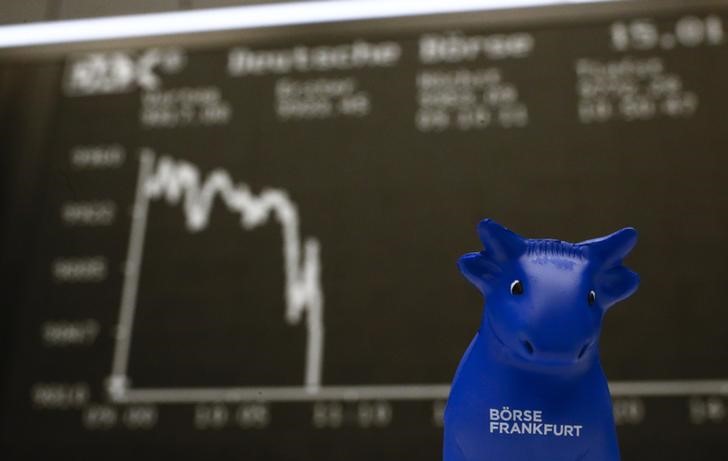
© Reuters.
By Peter Nurse
Investing.com – European stock markets traded sharply lower Thursday, continuing the global selloff with investors unnerved by fears over widespread inflation and a potential global economic slowdown.
By 3:45 AM ET (0745 GMT), the in Germany traded 1.9% lower, the in France fell 1.8%, and the U.K.’s dropped 1.6%.
European equities have followed on from weakness in Asia earlier Thursday and after a dramatic selloff on Wall Street overnight, with the blue-chip dropping over 1,100 points, or 3.6%, its biggest one-day loss since 2020.
Federal Reserve Chairman warned earlier this week that the U.S. economy could be hurt by attempts to reduce inflation, and a number of major U.S. retailers have posted disappointing quarterly earnings, warning of rising cost pressures, confirming investors’ worst fears over rising inflation.
Back in Europe, easyJet (LON:) stock rose 1.4% after the budget carrier a smaller loss than expected in the first half of its fiscal year, adding that it expects to fly 90% of pre-pandemic capacity in the third quarter but warned that it still can’t give guidance for the full year.
Assicurazioni Generali (BIT:) stock rose 0.8% after the Italian insurer a 9.3% drop in first-quarter net profit year-on-year, a smaller than expected fall after recording impairments on its Russian investments.
IAG (LON:) stock fell 1.4% after the owner of British Airways committed Thursday to additional spending, agreeing to order 50 Boeing (NYSE:) 737 MAX jets for delivery between 2023 and 2027.
Credit Suisse (SIX:) stock fell 2.5% after the beleaguered Swiss lender received its second ratings downgrade of the week, with Fitch following Standard & Poors in downgrading the bank’s long-term issuer default rating to BBB+ from A-.
Elsewhere, the from the latest European Central Bank meeting are due for release later in the session, with investors looking for clues for a potential timetable for monetary policy tightening.
Oil prices stabilized Thursday after the previous session’s losses.
Data from the , released late Wednesday, showed U.S. crude oil inventories fell 3.4 million barrels for the week ended May 18, an unexpected drawdown, suggesting substantial demand.
Oil prices have generally been rising as Russian supply is squeezed by bans from several countries in the wake of the invasion of Ukraine.
The European Union has also proposed a phased total ban on Russian oil imports in six months’ time, although these measures have yet to be adopted amid opposition from some eastern countries, including Hungary.
By 3:45 AM ET, futures traded 0.2% lower at $106.84 a barrel, while the contract rose 0.2% to $109.35. Both contracts fell around 2.5% on Wednesday.
Additionally, fell 0.3% to $1,810.14/oz, while traded 0.2% higher at 1.0487.


Be the first to comment